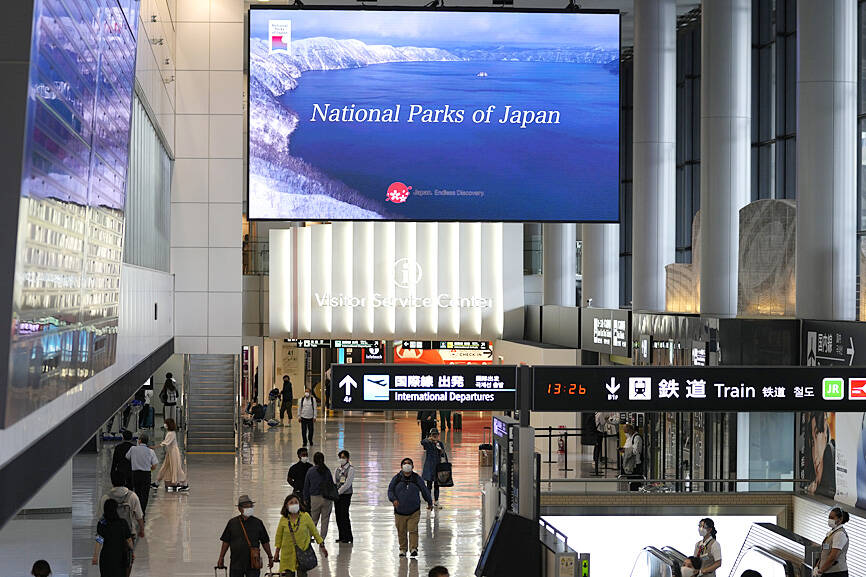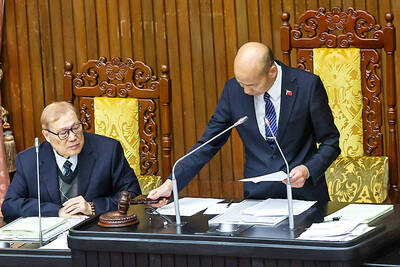Japan might lift requirements for pre-departure COVID-19 tests for travelers and raise daily caps on entrants, local media have reported.
Japan has some of the strictest COVID-19 pandemic border measures among major economies, requiring travelers to present a negative COVID-19 test taken within 72 hours of departure.
The government might soon waive tests for vaccinated passengers, with the change taking effect in a few weeks, Nikkei reported late on Monday.

Photo: AP
A daily cap of inbound travelers might be raised from 20,000 to 50,000 as early as next month, Fuji News Network said yesterday.
Japanese Chief Cabinet Secretary Hirokazu Matsuno declined to comment on the timing of any border easing, saying it would depend on COVID-19 conditions in Japan and overseas.
“Along with taking every measure to prevent contagion, we’ll also promote economic activity — and with border control measures, we’ll relax them in stages while keeping these two things in balance,” Matsuno told reporters.
The Japanese Ministry of Foreign Affairs said it is aware of the media reports, but deferred comment to the Ministry of Health, which has jurisdiction over border infection controls.
The health ministry did not immediately respond to a request for comment.
Japanese Prime Minister Fumio Kishida, who is recuperating from COVID-19 at his home after testing positive on Sunday, said in May that he wanted to bring Japan’s border measures more in line with those of other G7 nations.
Japan in June opened up to tourists for the first time in two years, although visitors must get visas and stick to guided, package tours.
Domestic and foreign business groups have urged a greater relaxation of Japan’s border controls, saying the measures risk causing the nation to fall behind economically.
European and US business lobbies welcomed the reported easing of measures, while urging Japan to reinstate visa-waiver eligibility for business travelers and tourists.

DEFENDING DEMOCRACY: Taiwan shares the same values as those that fought in WWII, and nations must unite to halt the expansion of a new authoritarian bloc, Lai said The government yesterday held a commemoration ceremony for Victory in Europe (V-E) Day, joining the rest of the world for the first time to mark the anniversary of the end of World War II in Europe. Taiwan honoring V-E Day signifies “our growing connections with the international community,” President William Lai (賴清德) said at a reception in Taipei on the 80th anniversary of V-E Day. One of the major lessons of World War II is that “authoritarianism and aggression lead only to slaughter, tragedy and greater inequality,” Lai said. Even more importantly, the war also taught people that “those who cherish peace cannot

STEADFAST FRIEND: The bills encourage increased Taiwan-US engagement and address China’s distortion of UN Resolution 2758 to isolate Taiwan internationally The Presidential Office yesterday thanked the US House of Representatives for unanimously passing two Taiwan-related bills highlighting its solid support for Taiwan’s democracy and global participation, and for deepening bilateral relations. One of the bills, the Taiwan Assurance Implementation Act, requires the US Department of State to periodically review its guidelines for engagement with Taiwan, and report to the US Congress on the guidelines and plans to lift self-imposed limitations on US-Taiwan engagement. The other bill is the Taiwan International Solidarity Act, which clarifies that UN Resolution 2758 does not address the issue of the representation of Taiwan or its people in

The Philippines yesterday criticized a “high-risk” maneuver by a Chinese vessel near the disputed Scarborough Shoal (Huangyan Island, 黃岩島) in a rare incident involving warships from the two navies. The Scarborough Shoal — a triangular chain of reefs and rocks in the contested South China Sea — has been a flash point between the countries since China seized it from the Philippines in 2012. Taiwan also claims the shoal. Monday’s encounter took place approximately 11.8 nautical miles (22km) southeast” of the Scarborough Shoal, the Philippine military said, during ongoing US-Philippine military exercises that Beijing has criticized as destabilizing. “The Chinese frigate BN 554 was

LEISURE: The new law adds Confucius’ birthday, the anniversary of the Battle of Guningtou, Constitution Day and Little New Year as national holidays The Legislative Yuan yesterday passed new legislation adding four national holidays and making Workers’ Day a national holiday for all sectors. The Chinese Nationalist Party (KMT) and the Taiwan People’s Party used their combined majority in the legislature to push the jointly proposed draft through its third and final reading. This new law supersedes the existing regulations for the implementation of memorial days and state holidays, which are administered by the Ministry of the Interior. The new law recognizes Confucius’ birthday on Sept. 28, the anniversary of the Battle of Guningtou on Oct. 25, Constitution Day on Dec. 25 and “Little New Year,”